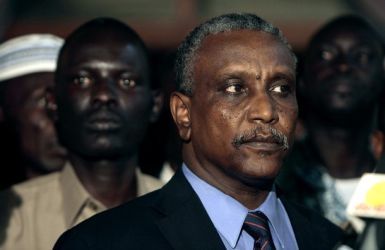SPLM-N reiterates demand for holistic talks
February 26, 2014 (KHARTOUM) – The Sudan People’s Liberation Movement-North (SPLM-N) has reiterated its demand for a broader political process to end the nearly three-year-long conflict in South Kordofan and Blue Nile, with parties expected to resume talks on 28 February.

After a meeting between the chief mediator Thabo Mbeki with the Sudanese president Omer al-Bashir on Tuesday, the Sudanese government announced its acceptance to the proposed agreement. Opposition leader Sadiq al-Mahdi also called for talks in Addis Ababa to be limited to the Two Areas, saying the constitutional reforms should be discussed in Khartoum.
“Our position is clear. We will stick to the comprehensive solution,” Yasir Arman, SPLM-N secretary-general and head of its negotiating team, said in a statement extended to Sudan Tribune on Wednesday.
“We will submit practical proposals, and will give the priority to a humanitarian cessation of hostilities. Also, we are with a peaceful solution that leads to [political] change but will not accept the reproduction of the regime,” Arman said, reacting to the draft framework agreement.
The rebel leader said that the current position of the government, which he described as aiming to limit the SPLM-N’s role to the Two Areas and denying its people their full citizenship rights, is a call to cede from Sudan.
“If you were not a citizen with your full rights in Sudan, the alternative is to look for full citizenship outside Sudan, such as what did the South Sudan,” he said.
The Sudanese government says the rebels have first to sign an agreement ending the conflict in the two states before to participate in a comprehensive political dialogue that Khartoum is engaging with the opposition forces.
In its negotiating position paper the government delegation also stressed the need to disarm SPLM-N combatants as it is agreed in the Comprehensive Peace Agreement of 2005.
Arman reacted with scepticism to the presidential call for national dialogue, saying the ruling party may only seek to gain time or it wants just to “freeze the war and write a new constitution to legitimise the upcoming elections and the re-production of its regime”.
MBEKI MEETS OPPOSITION FORCES
SPLM-N secretary-general welcomed the meetings of the chief mediator Thabo Mbeki with the opposition parties and said they requested him to meet them, considering such demarche is supportive for a holistic solution.
“We are favourable to these meetings and to Mbeki’s supervision for an inclusive political process under the auspices of the African Union and the United Nations, with the participation of the National Congress [Party], but not under its control,” he said.
The rebel chief negotiator, however, criticised the position of National Umma Party leader, Sadiq al-Mahdi, who called to limit the talks in Addis Ababa only to issues related to the two states.
Arman said they hoped to face the ruling party together with al-Mahdi, ” but it seems we stand in the face of the National Congress and Sadiq al-Mahdi,” he said.
“It seems that (new) political alliances are building up in the political arena, and we take it in account,” he added.
He however expressed readiness to work with al-Mahdi if the opposition party changes its position.
(ST)
